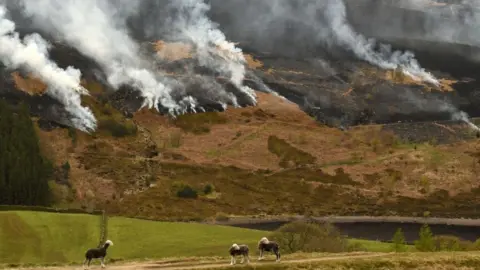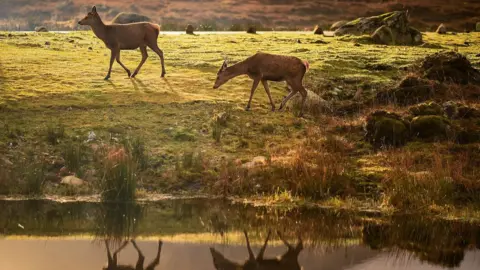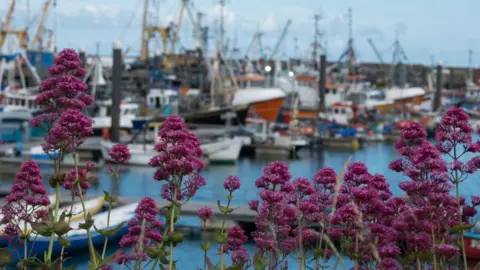UK government's 'toothless policies' failing to protect nature
 Getty Images
Getty ImagesA committee of MPs has lambasted the UK government's approach to nature, saying it is failing to stem huge losses of plants and species.
Their report says that the UK has the lowest remaining levels of biodiversity among the world's richer nations.
The MPs say the government spends far more on exploiting the natural environment than it does conserving it.
They're calling for legally binding targets for nature similar to the UK's climate laws.
Across the globe, a massive decline in the numbers of plant and animals species is ongoing, with up to a million currently under threat of extinction.
According to the Environmental Audit Committee (EAC), the UK reflects this international picture, with 15% of species under significant threat.
Over the past decade, the UK has failed to meet a raft of international targets to preserve nature, say the MPs.
 Mike Kemp
Mike KempAmong the richest G7 nations, the UK now has the lowest level of biodiversity
According to the report, existing policies and targets are simply inadequate and not joined up across government.
In recent months, the government has outlined a state of nature target to halt the decline in England by 2030.
But MPs say that legally-binding interim targets are needed for the plan to work, and they should measure species distribution, extinction risk, habitat condition and extent.
While the committee welcomed the government's pledge to protect 30% of the UK's land and seas by 2030, it said "simply designating areas as protected is not enough".
 OLI SCARFF
OLI SCARFFThese areas are often poorly-managed, say the MPs, and previous recommendations on how to improve them have not been taken up.
The MPs are also calling for a ban on peat products to be brought forward, along with the removal of any subsidies that harm nature.
"Although there are countless government policies and targets to 'leave the environment in a better state than we found it', too often they are grandiose statements lacking teeth and devoid of effective delivery mechanisms," said the EAC chair, Philip Dunne MP.
"We have no doubt that the ambition is there, but a poorly-mixed cocktail of ambitious targets, superficial strategies, funding cuts and lack of expertise is making any tangible progress incredibly challenging."
The committee says that all government departments must consistently factor nature into their policy decisions.
Without effective policies, the report says that "nature will continue to decline and the next generation will inherit a more depleted, damaged natural environment".

 Getty Images
Getty ImagesKey recommendations in the report:
- Just as the Climate Change Act enshrines legally-binding targets to cut carbon emissions, there should be legally-binding interim targets for a range of government policies to halt the decline of nature
- The government should find alternatives to GDP as mean of measuring economic success, for example moving towards a concept of inclusive wealth, which would measure the UK's produced, human and natural capital
- A severe shortage of trained ecologists is hampering efforts by local governments to oversee biodiversity policies - the committee recommends investment in training and skills as part of the government's plans for green jobs
- A legally-binding target for soil health should be established
- The committee supports the establishment of a Natural History GCSE in schools and recommends nature visits and teaching outside, to ensure that future generations value and protect biodiversity

Responding to the report, Environment Secretary George Eustice said: "Our Environment Bill will deliver the most ambitious environmental programme of any country on Earth and drive forward action to protect nature and improve biodiversity, including through a target for species abundance for 2030, aiming to halt the decline of nature.
"This is alongside our guaranteed £640m investment in the Nature for Climate Fund for woodland creation and peat restoration, plans to treble tree planting before the end of this Parliament, and increased protections for England's waters through pilots of Highly Protected Marine Areas."
Mr Eustice said the government would respond to the EAC review in due course.
Green groups have welcomed the tough language in the report.
"Transformative change to reverse nature's decline, as recommended by the Environmental Audit Committee's scathing report, requires much more than standing on a podium spouting fine words," said Rebecca Newsom from Greenpeace UK.
 Matt Cardy
Matt Cardy"We need legally-binding short-term targets, proper enforcement of environmental protections on land and at sea, with the funding to match, and a fundamental overhaul of government policy and legislation which puts nature at the heart of decision making."
The report has been issued ahead of a number of key political summits in the upcoming months that will tackle the crises in climate change and species loss.
The threat to biodiversity must be treated with urgency and ambition and raised up the political agenda, say the MPs. This has already happened with climate, it now needs to happen to nature as well.
Follow Matt on Twitter.
